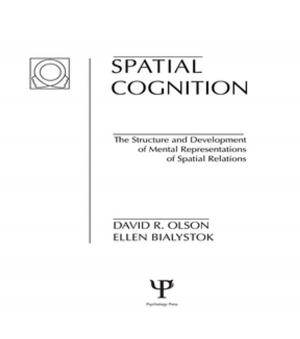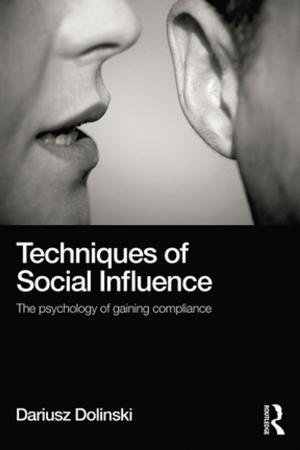| Author: | Joseph Gabel | ISBN: | 9781351291903 |
| Publisher: | Taylor and Francis | Publication: | January 16, 2018 |
| Imprint: | Routledge | Language: | English |
| Author: | Joseph Gabel |
| ISBN: | 9781351291903 |
| Publisher: | Taylor and Francis |
| Publication: | January 16, 2018 |
| Imprint: | Routledge |
| Language: | English |
Edited and with an introduction by Alan Sica.
In 1975 Joseph Gabel published a modern masterpiece which appeared in English as False Consciousness: An Essay on Reification. Combining his special knowledge of existential psychiatry, axiology, Marxism, and political history, Gabel proposed the utterly novel idea that victims of serious mental disturbances (especially paranoia and schizophrenia) reproduce those distorted thought patterns commonly associated with ideological beliefs at the collective level. Such beliefs initially had been laid bare in the 1920s by Gabel's intellectual progenitors, Karl Mannheim and George Lukacs. Gabel's remarkable innovation was to transfer the private crisis of mental collapse into the analytic framework previously reserved for ideological critique, making him an expert on what was later called "the micro-macro problem."
Ideologies and the Corruption of Thought includes Gabel's essays over the last 40 years, characteristically treating micro and macro theoretical matters simultaneously. Originally written in French and German, they have been recast in idiomatic English and bibliographically updated. Using a unique mode and vocabulary of analysis, Gabel offers theoretical investigations of McCarthyism and Stalinism (original and more recent types), as well as Althusser, Orwell, and Jonathan Swift in his capacity as a psychiatric theorist. He also explores anti-Zionism, anti-Semitism, and a fascinating case study of a paranoid who regarded himself as the pope. In addition this volume includes a range of general commentaries on ideological "thought," utopianism, and false consciousness.
This rich feast of social and political analysis and theory illuminates a range of contemporary concerns: racism, utopian fantasy, ethnocentrism, anti-Semitism, the interplay of social structure and mental illness, and ideological transformations of social life, which only Gabel's unique mixture of the clinical and the political could achieve. It will be studied with interest by all theorists and politically alert readers in the social sciences, philosophy, and related fields of study.
Edited and with an introduction by Alan Sica.
In 1975 Joseph Gabel published a modern masterpiece which appeared in English as False Consciousness: An Essay on Reification. Combining his special knowledge of existential psychiatry, axiology, Marxism, and political history, Gabel proposed the utterly novel idea that victims of serious mental disturbances (especially paranoia and schizophrenia) reproduce those distorted thought patterns commonly associated with ideological beliefs at the collective level. Such beliefs initially had been laid bare in the 1920s by Gabel's intellectual progenitors, Karl Mannheim and George Lukacs. Gabel's remarkable innovation was to transfer the private crisis of mental collapse into the analytic framework previously reserved for ideological critique, making him an expert on what was later called "the micro-macro problem."
Ideologies and the Corruption of Thought includes Gabel's essays over the last 40 years, characteristically treating micro and macro theoretical matters simultaneously. Originally written in French and German, they have been recast in idiomatic English and bibliographically updated. Using a unique mode and vocabulary of analysis, Gabel offers theoretical investigations of McCarthyism and Stalinism (original and more recent types), as well as Althusser, Orwell, and Jonathan Swift in his capacity as a psychiatric theorist. He also explores anti-Zionism, anti-Semitism, and a fascinating case study of a paranoid who regarded himself as the pope. In addition this volume includes a range of general commentaries on ideological "thought," utopianism, and false consciousness.
This rich feast of social and political analysis and theory illuminates a range of contemporary concerns: racism, utopian fantasy, ethnocentrism, anti-Semitism, the interplay of social structure and mental illness, and ideological transformations of social life, which only Gabel's unique mixture of the clinical and the political could achieve. It will be studied with interest by all theorists and politically alert readers in the social sciences, philosophy, and related fields of study.















